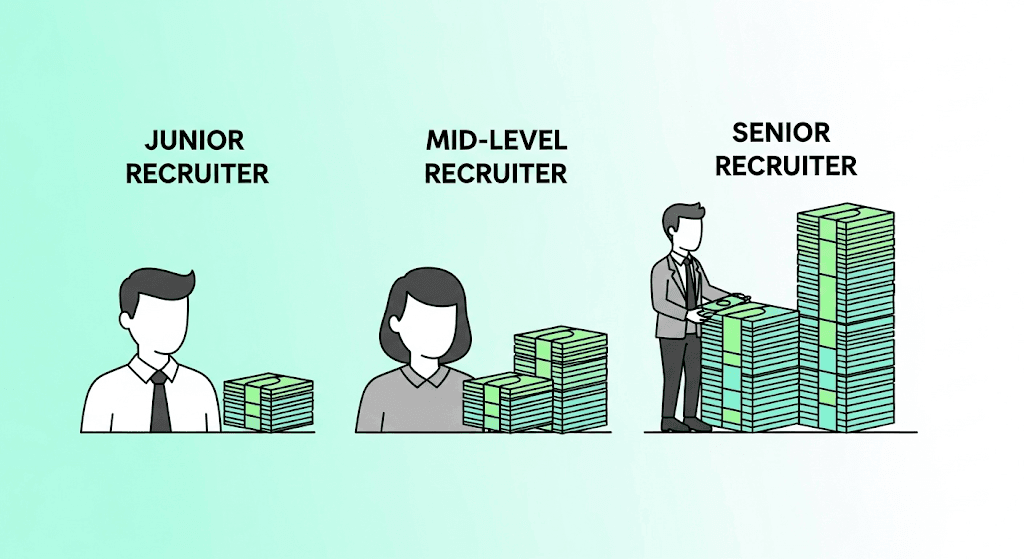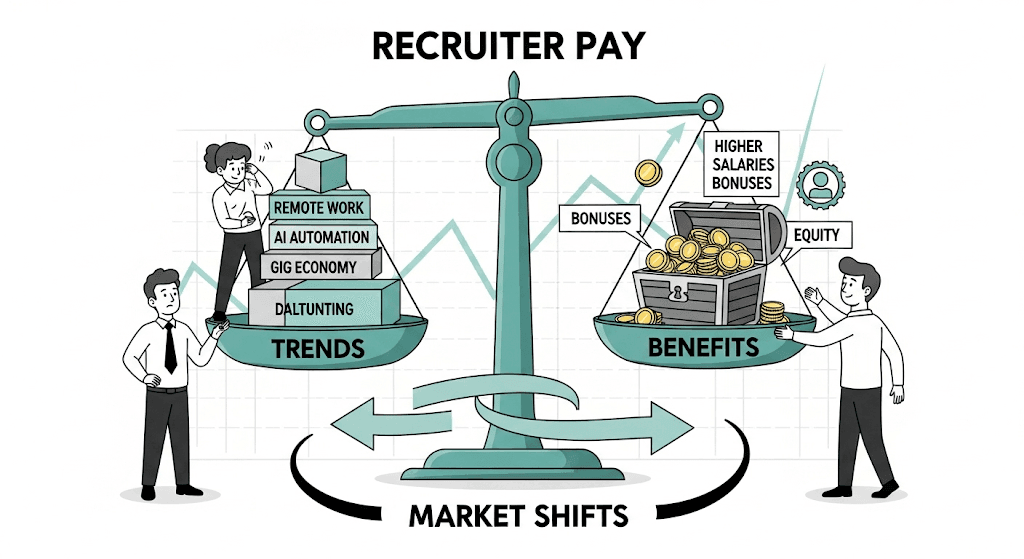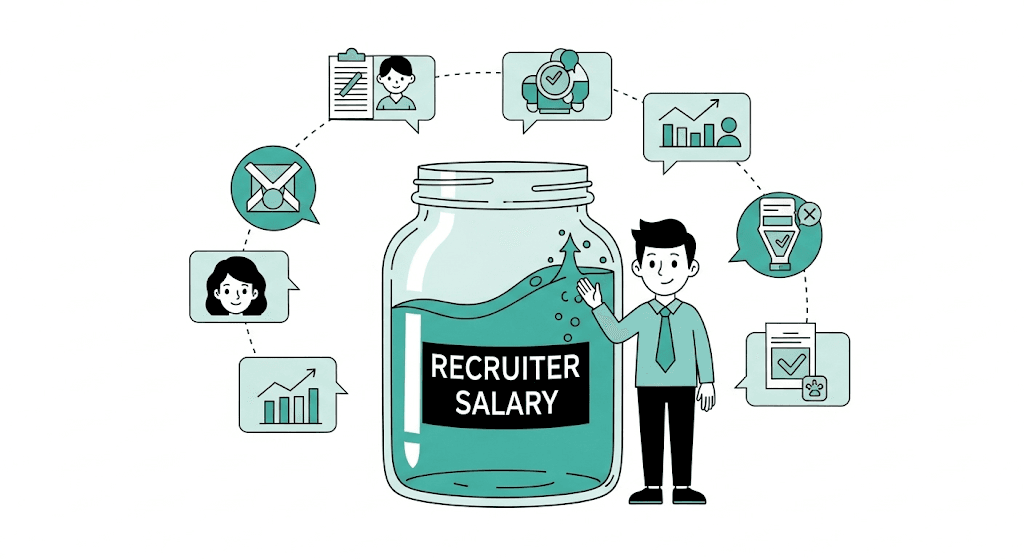How Much Does a Recruiter Make?
Updated : 5 months ago
 You’ve probably thought about it—“Recruiters help people land their dream jobs… but how much do they actually earn themselves?”
You’ve probably thought about it—“Recruiters help people land their dream jobs… but how much do they actually earn themselves?”
The answer isn’t as straightforward as you might think. Salaries for recruiters can vary wildly. It can be barely enough to cover rent in a big city. But it can go up to six-figure incomes that rival top corporate roles.
The gap is so huge that two recruiters sitting across from each other at a hiring conference could be living in completely different financial realities.
For job seekers, it raises curiosity. For aspiring recruiters, it’s a real pain point:
- Will this career path actually pay off?
- And for those already in the field, the burning question is—Am I being paid what I’m worth?
Let’s just pull back the curtain on recruiter salaries in 2025 - across industries, experience levels, and locations. The platforms like uRecruits provide insights for market pay trends and recruiter opportunities. It helps you see exactly where you stand and what it takes to move up the pay scale.
Why is There a Big Range in Recruiter Pay?
 When you look at a recruiter's salary reports, you think twice about, “How can one person make $40k and another make nearly $200k doing the same job title?” Well, it happens with everyone; you’re not alone. The wide pay gap can be divided into four key factors: role, experience, company, and location.
When you look at a recruiter's salary reports, you think twice about, “How can one person make $40k and another make nearly $200k doing the same job title?” Well, it happens with everyone; you’re not alone. The wide pay gap can be divided into four key factors: role, experience, company, and location.
Role & Specialization Matter
Not all recruiters are created equal. Well, at least, not in terms of earnings.
Generic vs. Specialized Roles:
A generalist recruiter or HR recruiter will typically earn less than those in niche positions.
If you talk about Executive recruiters. They are headhunted for high-level leadership roles and senior recruiters with years of experience. Further, they often command salaries well into six figures.
Industry Niche:
Keep in mind that specialization pays off—especially in high-demand sectors. Technical recruiters focusing on IT, AI, engineering, or other skill-scarce industries often receive premium pay. It is because the talent they source is harder to find.
Experience Level Counts

You must have seen many professions. The longer you’ve been in the game—and the better your performance, the more your paycheck grows.
Senior Recruiters earn an average base salary of $83,905. It also increases through bonuses and performance incentives.
Executive Recruiters have one of the broadest pay ranges—$54k to $157k base. If they are among the top performers, the total compensation can go beyond $180k. It also includes bonuses and commissions.
Entry-level or Associate Recruiters typically start in the $36k to $50k range, depending on the company and location.
Company Type & Reputation
The brand name on your paycheck can make a huge difference in your earnings.
Recruiters working for major job platforms or well-funded corporations usually receive higher pay packages.
Platforms like uRecruits also show how certain brands consistently rank higher in compensation benchmarks. You learn what makes them attractive targets for career moves.
| For instance, Indeed Recruiters average around $114,000/year, with the top percentile earning up to $195,000. That’s a far cry from what smaller companies can usually offer. | | :---- |
Location Influences Pay
Recruiter salaries are also shaped by geography. Major urban hubs with a high cost of living usually offer higher wages.
| For example, recruiters in New York City average $79,748/year, which is above the national average. Same way, tech-heavy regions like San Francisco or Austin can push recruiter salaries well above standard market rates. | | :---- |
What Trends, Benefits, and Market Shifts Are Changing Recruiter Pay?

If we talk about salary numbers, these tell only a small part of the story. In recruitment, some of the things can be just as influential in knowing the true value of a role. Those include -
- market shifts
- perks, and
- workplace satisfaction
Here’s what’s shaping recruiter compensation today:
Post-Pandemic Pay Adjustments
The payroll in the recruitment industry is not stable. During the hiring surge of 2021–2022, companies were competing fiercely for talent.
They were pushing recruiter salaries upward, too aggressively. However, by 2023 and beyond, market correction kicked in.
| A MarketWatch report noted: “New hires are being offered salaries 30%–40% lower than before... one posting listed $20/hr for senior-level responsibilities.” | | :---- |
In other words, even if the recruitment is still a strong career path, the days of inflated offers simply to secure a recruiter are becoming rare.
Benefits That Recruiters Get

It’s not always about the paycheck. Today, recruiters are getting compensated in other valuable ways. Those include especially those working in AI-powered or tech-heavy roles -
- Tuition assistance for ongoing education
- Parental leave policies. These exceed industry norms
- Remote work flexibility. It helps maintain work-life balance
- Wellness packages. It supports mental and physical health
In fact, AI-related recruitment roles are -
- twice as likely to offer parental leave and
- three times more likely to allow remote work
uRecruits can help you filter and find these benefit-rich roles quickly. The platform ensures you’re not just chasing salary, but total career value.
Pay Satisfaction & Gender Breakdown
Along with benefits, satisfaction matters. And, recruiters generally report high levels of it:
- Senior Recruiters rate their job satisfaction at 4 out of 5
- Technical Recruiters follow closely with an average satisfaction score of ~ 4.08/5
If we look from a demographic standpoint, recruitment remains a female-majority profession.
| For example, HR recruiters are nearly 89% female. It highlights both the inclusivity of the field and the ongoing conversations about pay equity. | | :---- |
Is Recruitment a High-Paying Career?

The short answer: It can be—if you play your cards right.
Recruitment isn’t a one-size-fits-all profession, especially when it comes to earnings. No doubt some entry-level recruiters start with modest salaries. Those cost around -
$36,000–$50,000.
Most experienced professionals in specialized or senior roles can earn well into six figures.
Executive recruiters, for instance, often see total compensation exceeding $180,000, especially when bonuses and commissions are included.
To be honest, the real earning potential lies in:
-
Specialization – These include technical, executive, and niche recruiters - they typically earn more.
-
Performance-based incentives – Many recruiters get bonuses or commission for a successful hire.
-
High-demand industries – Tech, healthcare, and finance roles often come with bigger placement fees.
So yes, recruitment can be a high-paying career. But only if you focus on -
- developing high-value skills
- building a strong client network, and
- targeting lucrative industries
What Factors Affect Recruiter Salaries?

The reason recruiter salaries vary so much is that the pay scale is highly influenced by -
- personal
- professional, and
- market-based factors
Here’s a breakdown of the most significant ones:
1. Role & Specialization
A recruiter’s niche is the strongest determinant of pay.
Generalist recruiters or those in administrative/HR-focused roles often earn less. The reason is that they work in highly competitive markets. It means the candidate sourcing is relatively straightforward.
Specialized recruiters are involved in tech, healthcare, or executive search. They often earn 20–40% more than generalists. The reason is that their roles require deeper industry knowledge and a stronger network.
2. Experience Level
You must have heard about it: time in the field directly impacts earning potential:
- Entry-Level / Associate Recruiter: ~$36k–$50k
- Mid-Level Corporate Recruiter: ~$65k–$80k
- Senior Recruiter: ~$80k–$100k+
- Executive Recruiter: $95k–$150k base, $180k+ with bonuses
3. Company Size & Reputation
Bigger brands tend to provide better pay and benefits packages.
| For instance, Indeed Recruiters earn an average of $114k, with top performers reaching $195k. It is far above what many small agencies can offer. | | :---- |
Well-funded startups in competitive industries can also pay aggressively to secure top recruitment talent.
4. Location
Well, geography also plays a huge role in determining salary. Recruiters in high-cost-of-living areas like New York City, San Francisco, or Austin often earn 10–20% above the national average.
| Example: In New York City.), recruiters earn an average of $79,748/year, compared to the national average of ~$63,000. | | :---- |
5. Performance Incentives
Recruitment is one of the few professions where your paycheck can grow dramatically with performance.
Agency recruiters, in particular, often earn a commission based on the first-year salary of every successful placement.
For high-value hires that commission can be in the five-figure range.
6. Market Conditions
When the job market is booming, salaries and commissions boom due to increased hiring needs. During slower economic periods, even if the base pay may hold steady, commissions can take a hit.
Do Recruiters Make More in Agency or In-House Roles?

Here we are, with one of the biggest salary debates in recruitment. So, what is it? Among agency recruiters and in-house recruiters, who take home more money. The answer is that one-size doesn’t fit all. Both paths can provide unique earning structures.
| Aspect | Agency Recruiters | In-House (Corporate) Recruiters | | :---- | :---- | :---- | | Base Pay | $40k–$60k | $60k–$85k | | Variable Pay | Commission: 15%–30% of the placed candidate’s first-year salary | Smaller performance bonuses or hiring incentives | | Earning Potential | High performers earn $150k–$250k+ annually | $100k–$120k; Senior roles may exceed this | | Example | Placing a $120k candidate at 20% commission = $24k from one hire | N/A | | Upside | Higher earning | Stability, predictable workload, benefits (healthcare, PTO, retirement plans) | | Downside | Income fluctuations during - slow hiring seasons or downturns | Lower ceiling for - earnings, fewer income spikes |
To Sum Up
Recruitment is one of those careers where your income potential can change dramatically. It can be —
- by role
- by industry, and
- even by the type of company you work for
If stability, predictable hours, and benefits are your priority, in-house roles may be the better fit. However, if you grow up in a high-pressure, results-driven environment and improve your earning potential, agency recruitment can be an option.
At the end of the day, your recruiter's paycheck will largely be determined by -
- where you work
- who you work for, and
- How well you play the game
So, you need to focus on building deep expertise, growing your network, and targeting industries willing to pay a premium for hard-to-find talent.
Using platforms like uRecruits can give you a competitive edge. It helps to understand salary benchmarks, find high-paying niches, or connect directly with employers who value skills.
Frequently Asked Questions
1. Is recruitment a high-paying career?
Yes, it can be—especially in agency settings or specialized niches like tech and executive search. You get commissions that significantly boost earnings.
2. What factors affect recruiter salaries the most?
Experience, location, industry, company size, recruitment type, and performance metrics.
3. Do agency recruiters really earn more than corporate recruiters?
In peak performance scenarios, yes. Agency recruiters can earn from corporate recruiters thanks to commission-based pay structures. However, income can be inconsistent, depending on market demand.

